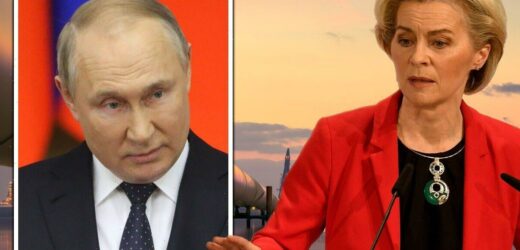Ukraine: Europe shamed over Russia gas sanctions delay
We use your sign-up to provide content in ways you’ve consented to and to improve our understanding of you. This may include adverts from us and 3rd parties based on our understanding. You can unsubscribe at any time. More info
European Commission President Ursula von der Leyen is poised to propose a plan that would ban Russian oil by the end of the year. A ban on Russian oil and gas exports would be a devastating blow to Putin, as revenues from the energy industry account for about 40 percent of the country’s budget in 2021. According to a report from the Centre for Research on Energy and Clean Air (CREA), Moscow has earned over €63billion (£52.8 billion) from the export of oil, gas and coal since the war began on February 24.
Experts warn that Europe’s heavy reliance on Russian fossil fuels is bankrolling Putin’s invasion of Ukraine, as Western powers have placed crippling sanctions on nearly all other aspects of Moscow’s economy.
Sources told Politico that the sanction proposal will be issued on Tuesday, right before EU ambassadors meet on Wednesday.
The EU will not issue an immediate ban on Russian oil, according to sources, but rather will form a plan to phase out oil imports from Moscow by the end of the year.
Fearing retaliation from Putin in the form of a ban on gas flowing to Europe, the bloc has been reluctant to sanction Russia’s energy sector so far.


Aside from a plan to phase out Russian oil, the EU sanctions will also include more high profile individuals and will target more Russian banks, such as Sberbank.
As the war in Ukraine continues, even countries like Germany, which has heavily reliant on Putin for gas, have suggested that they are ready to phase out Russian oil by the end of the year.
Last week, an EU diplomat told Politico, “Germany’s ambassador on Wednesday announced Berlin’s new position, saying they are not only OK with oil sanctions, but they actively support an oil phaseout, rather than just a price cap, and a ban on Russian uranium.

“It is important for the Germans, Austrians and others that the EU reduces its energy dependency on Russia across the board.
“This includes banning imports of Russian nuclear fuels as well. For them, it is a bit of a no-brainer.”
However, many EU members are reportedly hesitant about a ban, fearing the impacts it would have on gas prices.
As an alternative, Italy and Greece have proposed a price cap on oil imports, using the bloc’s position as the largest purchaser of Russian energy to control prices.
DON’T MISS:
UK to avert Russia energy crisis with ‘clean, cheap, sovereign system’ [REVEAL]
London handed 15 minute nuclear warning after Russian threat [SPOTLIGHT]
Germany to soften Russia stance as Scholz’ ‘double-dealing’ [INSIGHT]


The bloc’s actions against Russia could have some major ramifications, with German Chancellor Olaf Scholz warning that the EU’s largest economy is preparing for a Russian supply cut after Moscow refused payment from Berlin in euros.
The German Chancellor warned: “You have to be prepared for that, and we were already prepared before the war started and we know what we have to do.”
Source: Read Full Article


